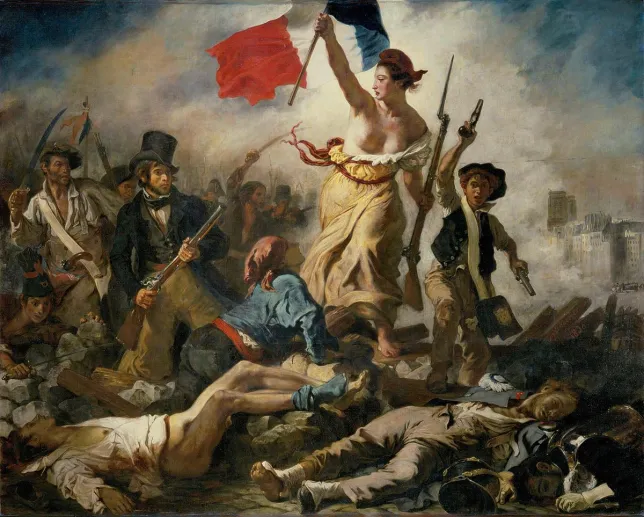The Revolution which Still Stirs

When examining Western history there are four major revolutions that need to be examined in order to gain a proper understanding of how American and European societies developed. They are the English, American, French, and Russian revolutions.
The French Revolution is not quite the forgotten revolution, but I would venture it’s almost certainly the revolution the general public is least interested in.
In sharp contrast, I contend that the French Revolution is the most significant revolution for us today, mostly because it grappled with issues and themes which still drive discourse today. Unlike the other revolutions, the Revolution lacks a more definite end and resolution. For instance, the end of the Revolution is typically stated empathically as November 9, 1799 when Napoleon executed a successful coup and took over the French government. However, that was not the end of the unrest that characterized the Revolution. Following Napoleon’s defeat, the monarchy lead by the previously ousted Bourbons, was restored, but of course that would not last. For the better part of a century, the French government routinely changed between a monarchy, an empire, and a republic. Having such a climate of continual unrest does not bode well for any society that wishes to prosper.
Opinions on the Revolution
Most historians in academia have viewed the Revolution in a positive light; it was seen as ushering in modernity and helping to topple one of the last bastions of feudalism. It also codified individual rights for the common citizen via The Declaration of the Rights of Man and of the Citizen. It’s only near the end of the 20th century that some historians began taking a fresh look at the Revolution, demanding more time be spent examining the violence that took place. These historians have been cast as “conservative ideologues”, but I think it’s fair to ask if the cause of liberty could have been pursued without such violent means. It’s one thing to kill in order to achieve political ends, but the violence perpetuated during the Revolution was of a savagery that has few parallels in history. At one point during the Revolution, killing became an end of itself, not a means.
Of course the more one examines the violence during the Revolution, the more obvious the parallels to the totalitarian governments of the 20th century become. I suspect this is the reason for downplaying the violence of the Revolution; for it’s fair to say that the Revolution represents the beginning of the modern Left. In fact, the use of the term “left” to represent political beliefs originated during this period. The leading socialist magazine today, the Jacobin, is named after the political party that set The Reign of Terror in motion, that’s how much the Left is tied to this moment in history.
Irreconcilable Beliefs
As the historian Simon Schama argued, the Revolution attempted to pursue two irreconcilable goals at the same time, one was an attempt to use a powerful State to provide security for the masses, the other was to protect the natural rights of the individual. But as Liberals have labored to demonstrate, this is an impossible feat to achieve. A State that is powerful enough to provide an individual with subsistence, is also one that is powerful enough to take everything he owns.
Because of this, at various points in the Revolution we can see shades of both Liberalism and Socialism fighting to steer the Revolution in their direction. In my opinion, a more useful framework is to view the Revolution as a struggle of ideologies, not as a class struggle as it’s been traditionally viewed. The socialists of their day, the Jacobins, eventually won and with that came a set of policies we are all familiar with. Price controls in order to attempt to make bread more affordable, as well as controls on free speech to try and quell the unrest. The arguments used by proponents of these measures are almost word for word what you will hear today in the media.
The Revolution is where Socialism got to try out its ideas from a position of power for the first time, and from there it eventually made it’s way to Russia setting off their own revolution. The general consensus from the collapse of the Soviet Union is that when Socialism is centered on the idea of government overly managing or outright owning the means of production then Socialism is unworkable, but the hope of realizing a State that can guarantee security has not been abandoned by socialists. It has merely transformed to what today we refer to as the welfare state.
In my view, the end result of the Revolution is what we have today in all the major Western nation states, the mixed economy. The mixed economy is capitalist in the sense that individuals have a right to property and can dispose of their assets as they see fit, but socialist in that the State claims the right to proceeds from any revenue those assets make. It’s a compromise, an arrangement that has confined the unrest to struggles at the ballot box rather than riots in the streets; although, even this arrangement is perhaps reaching its expiration date.
This all comes back to my original point that the Revolution is the most relevant of the major revolutions because it can help us understand the conflict of ideologies that drive discourse today. I don’t quite think that Napoleon brought an end to the Revolution, but he did provide a measure of stability. If history rhymes instead of repeating, then it’s not unreasonable to see Trump fulfilling the same role Napoleon fulfilled more than 200 years ago.